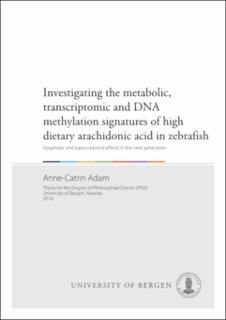| dc.contributor.author | Adam, Anne-Catrin | |
| dc.date.accessioned | 2018-09-18T09:58:03Z | |
| dc.date.available | 2018-09-18T09:58:03Z | |
| dc.date.issued | 2018-03-14 | |
| dc.identifier.uri | https://hdl.handle.net/1956/18497 | |
| dc.description.abstract | Background. Nutrition is one of the important environmental determinants of individual health. Alteration in dietary omega-3 and omega-6 polyunsaturated fatty acid (n-3 and n-6 PUFA) profiles is known to affect the health and welfare of farmed fish, but is also a consideration for human health, particularly considering current dietary habits (Western diet). In aquaculture fish feeds, marine ingredients are increasingly substituted with plant-based materials. The resulting lower dietary n-3/n- 6 PUFA ratio due to higher plant oil inclusion in the diets, can affect both metabolism and physiology of the fish. Today’s global nutrition and lifestyle habits of humans, i.e. increasing amounts of vegetable oils combined with a higher consumption of animal products, have been associated with the increased incidence of chronic diseases such as cardiovascular diseases, cancer, obesity, metabolic syndrome and other chronic inflammatory diseases. Diet can affect individual phenotypes and several animal studies supported the notion that metabolic influences and epigenetic regulation of gene expression during early development can be linked to health outcomes later in life and across generations. This project aimed to investigate the effects of high dietary n-6 PUFAs, particularly arachidonic acid (ARA), on parental metabolic profiles and on both hepatic gene expression and DNA methylation profiles in the first and following generation of zebrafish (Danio rerio). Design. In a transgenerational feeding trial, zebrafish (F0) were fed a plant-based diet either low (control) or high in ARA (high ARA) from 27 DPF onwards, whereas progeny (F1) from both groups were fed only the control diet. Body weight was recorded at juvenile stage in F0 and at adult stage in both F0 and F1. The effect on the metabolic fingerprint using metabolomics was analysed in juvenile fish after feeding the experimental diets for 17 days. Diet associated changes in the gene expression and DNA methylation profiles in adult male F0 and F1 livers were investigated using RNAsequencing and reduced representation bisulfite sequencing, respectively. Results. In the parental (F0) generation, high dietary ARA-associated metabolic profiles were characterized by increased levels of dicarboxylic acids, pro-inflammatory eicosanoids, oxidized lipids and amino acids, a lower n-3/n-6 PUFA ratio and changed levels of n-3 and n-6 PUFAs, complex lipids and metabolites with known antioxidative properties. Differential expressed genes (DEGs) involved in β-oxidation, RXR and PPAR signalling were observed for F0 livers. A stronger response on hepatic transcriptomic profiles was found in the progeny, where F1 DEGs were related to methionine cycle, transsulfuration pathway, estrogen signaling, and lipid and retinoid metabolism by PPARα/RXRα playing a central role. Several links were found between parental metabolic and both transcriptomic and DNA methylation patterns of progeny livers. Identified upstream regulators (CNR1, RORA, PPARA, PPARGC1A and ESR2) based on F1 DEGs were also linked to differential DNA methylation in the livers of the adult progeny. Those regulators function in de novo lipogenesis through PPAR downstream signalling, possibly affecting energy metabolism and estrogen signalling. An effect on F0 body weight, but not length was observed at 44 DPF, but growth at 91 DPF was equal for both feed groups. No differences in mature body weight was observed between dietary groups in both generations. Conclusions. Results from metabolic profiling revealed a general shift in lipid profiles, signs of lipid peroxidation and an oxidised and pro-inflammatory environment, which led to an anti-inflammatory and anti-oxidative response to high dietary ARA in the fish. High dietary ARA levels did not affect the body weight of zebrafish in this study. Changes in liver DNA methylation and gene expression profiles in adult male progeny were associated with the parental diet, whereas the effect on gene expression was less strong in parents than in progeny. Several links were found between the metabolic profiles in parents and both DNA methylation and gene expression of the progeny, which suggested an impact of parental diet on the progeny perhaps during early embryonic development. Embryonic development can be influenced and adult hepatic gene expression patterns possibly primed through either epigenetic mechanisms or modulation of nutrient composition in the yolk. | en_US |
| dc.language.iso | eng | eng |
| dc.publisher | The University of Bergen | en_US |
| dc.relation.haspart | Paper I: Adam AC, Lie KK, Moren M, Skjaerven KH. High dietary arachidonic acid levels induce changes in complex lipids and immune-related eicosanoids and increase levels of oxidised metabolites in zebrafish (Danio rerio). Br J Nutr. 2017 May 09:1-11. <a href="https://doi.org/10.1017/S0007114517000903" target="blank">https://doi.org/10.1017/S0007114517000903</a> | en_US |
| dc.relation.haspart | Paper II: Anne-Catrin Adam, Kaja Helvik Skjærven, Paul Whatmore, Mari Moren, Kai Kristoffer Lie. Parental high dietary arachidonic acid levels modulated the hepatic transcriptome of adult zebrafish (Danio rerio) progeny. Submitted. <a href="https://doi.org/10.1371/journal.pone.0201278" target="blank"> https://doi.org/10.1371/journal.pone.0201278</a> | en_US |
| dc.relation.haspart | Paper III: Anne-Catrin Adam, Kai Kristoffer Lie, Paul Whatmore, Lars Martin Jakt, Mari Moren, Kaja Helvik Skjærven. Profiling DNA methylation patterns of zebrafish liver associated with parental high dietary arachidonic acid. Manuscript. Full-text not available. | en_US |
| dc.title | Investigating the metabolic, transcriptomic and DNA methylation signatures of high dietary arachidonic acid in zebrafish: Epigenetic and transcriptional effects in the next generation | en_US |
| dc.type | Doctoral thesis | |
| dc.rights.holder | Copyright the author. All rights reserved. | en_US |
| dc.subject.nsi | VDP::Matematikk og Naturvitenskap: 400::Zoologiske og botaniske fag: 480::Marinbiologi: 497 | en_US |
